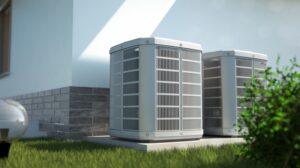As the world moves towards more sustainable energy solutions, the spotlight on heat pumps is brighter than ever. These innovative devices offer both heating and cooling functionalities while significantly reducing carbon footprints.
However, are heat pumps truly a great investment? In this article, we will delve into the factors to consider when evaluating the investment value of heat pumps and the suitability of heat pump installation in Madison County, Georgia.
Understanding Heat Pumps
Before diving into their investment potential, let us briefly explain how heat pumps work. These systems transfer heat from one place to another using refrigerant and compression/expansion processes. In heating mode, they extricate heat from the outside air (even in cold temperatures) and move it inside. In cooling mode, the process reverses, expelling heat from indoors to outdoors.
Five Factors to Consider
Energy Efficiency: Unlike traditional heating systems like furnaces which generate heat, heat pumps simply move it. This results in lower energy consumption and reduced utility bills, especially in moderate climates.
Initial Cost vs. Long-Term Savings: While heat pumps have a higher upfront cost compared to conventional heating and cooling systems, they often provide substantial long-term savings through lower energy bills and potentially reduced maintenance costs. Calculating the payback period based on your energy usage and local utility rates can help determine if the investment makes financial sense.
Georgia has the ideal climate for heat pumps, and a heat pump can save you 20% to 40% a year with lower utility costs. This should allow homeowners to recoup their investment costs over the lifespan of the system.
Environmental Impact: With increasing emphasis on environmental sustainability, heat pumps offer a greener alternative to fossil fuel-based heating systems. Because they rely entirely on electricity, heat pumps significantly reduce carbon emissions. Consider the environmental benefits alongside financial considerations when evaluating their investment value.
Durability and Maintenance: Heat pumps typically have fewer moving parts than traditional HVAC systems, leading to potentially lower maintenance requirements. However, routine maintenance is still required twice a year to ensure optimal performance and longevity. Factor in ongoing maintenance costs and the expected lifespan of the system when assessing its investment value.
Rebates and Incentives: Many local governments and utility companies offer rebates, tax credits, or other incentives for installing energy-efficient heat pumps. These incentives can significantly offset the initial cost and improve the overall return on investment. Explore available programs in your area to maximize savings.
Conclusion
In conclusion, determining whether a heat pump is a great investment involves considering several factors such as energy efficiency, initial cost, long-term savings, environmental impact, durability, and available incentives.
A heat pump offers numerous benefits, including lower energy bills, reduced carbon emissions, and potential financial incentives. Ultimately, conducting a thorough evaluation based on your specific circumstances will help determine if a heat pump aligns with your investment goals and sustainability objectives.
Remember, a heat pump is not just an investment in comfort; it is an investment in a more sustainable future.
Contact JN Electrical Temperature Control, Inc., and you’ll “Feel the Difference”!


